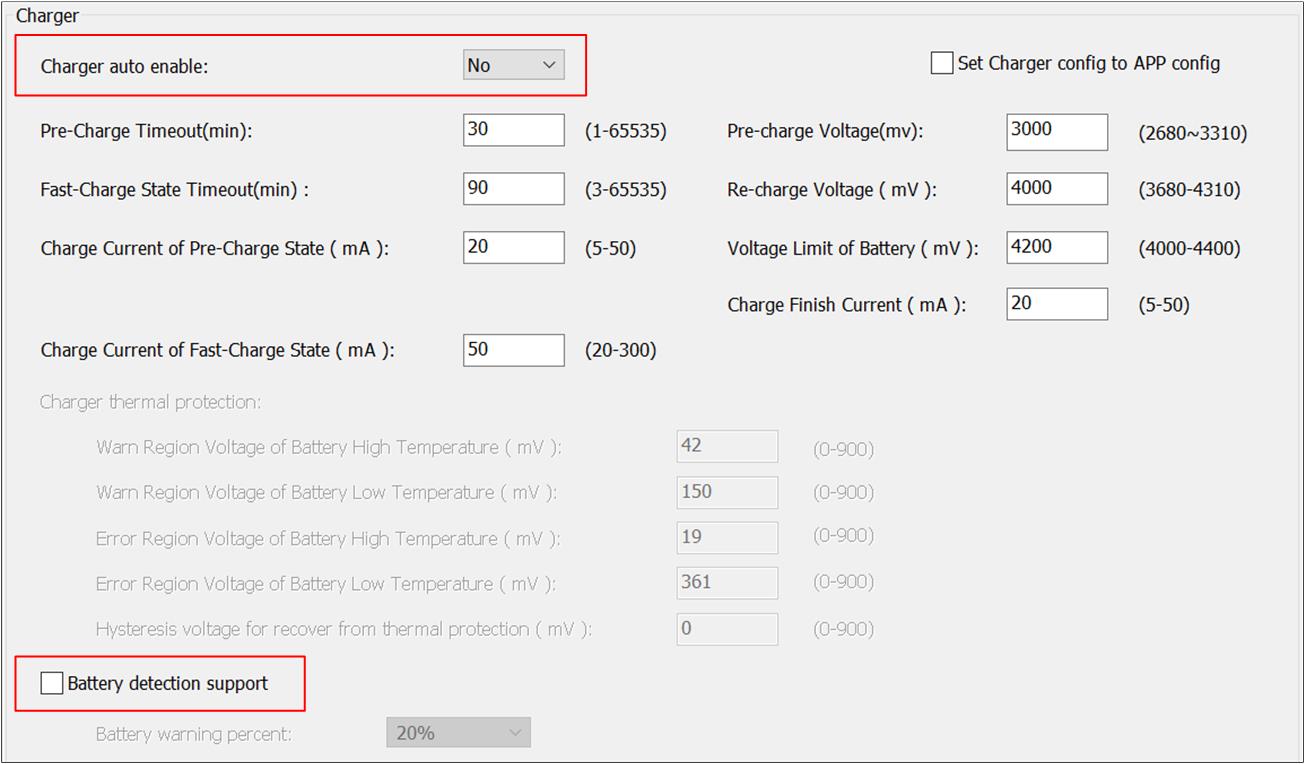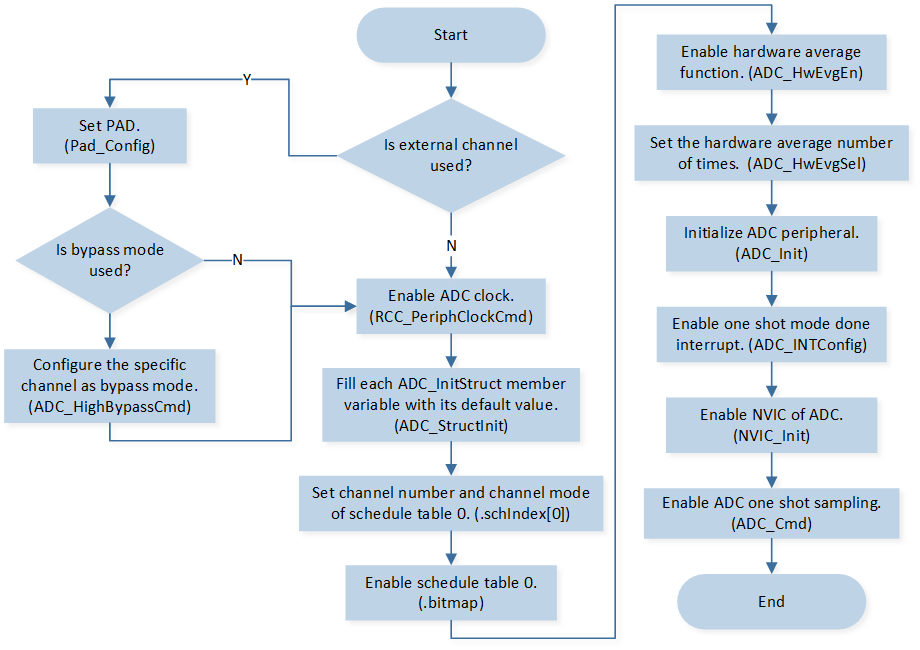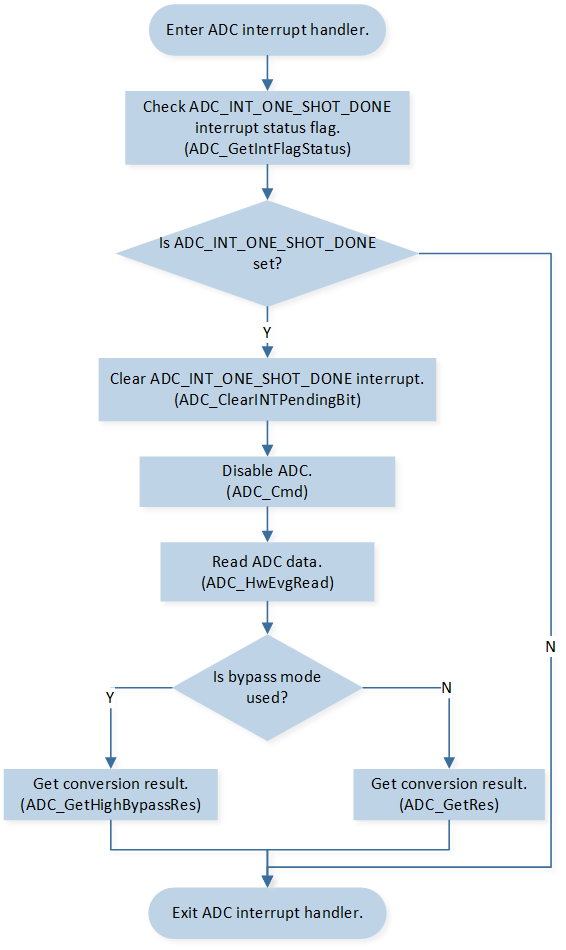ADC Hardware Average Funcion
This sample code guide is designed to help users easily and comprehensively understand ADC sample. This sample demonstrates how ADC samples data with hardware average function. This sample uses the hardware average function of the ADC peripheral to measure voltage on P0_1. ADC hardware average function can only be used in one shot mode and only schedule table 0 can be used. For RTL87x3E and RTL87x3EP, it is recommended to use the hardware average function.
Requirements
For hardware requirements, please refer to the Requirements.
Wiring
Connect P0_1 of EVB to an external DC voltage source. Input voltage of P0_1 must range from 0 to 3.3V.
Configurations
The entry function is as follows, call this function in main() to run this sample code. For more details, please refer to the Initialization.
adc_hw_average_demo();
Building and Downloading
For building and downloading, please refer to the Building and Downloading.
Experimental Verification
Press the Reset button on the EVB board, after initialization is complete, the ADC begins sampling. Once ADC sampling is finished, the converted voltage values will be printed in Debug Analyzer.
adc_handler: result xxx
Code Overview
This section introduces the code and process description for initialization and corresponding function implementation in the sample.
Note
To use the mode, please turn off Charger auto enable and Battery detection support on the MCUConfig Tool. As shown in Turn Off Charger on the MCUConfig Tool.

Turn Off Charger on the MCUConfig Tool
Source Code Directory
For project directory, please refer to Source Code Directory.
Source code directory:
sdk\src\sample\io_demo\adc\adc_hw_average\adc_hw_average_demo.c.
Initialization
The initialization flow for peripherals can refer to Initialization Flow.
The initialization flow of ADC sampling in one shot mode by hardware average is shown in the following figure.

ADC One Shot Sampling by Hardware Average
-
Call
Pad_Config()andPinmux_Config()to initialize the pin.static void board_adc_init(void) { Pad_Config(ADC_1, PAD_SW_MODE, PAD_IS_PWRON, PAD_PULL_NONE, PAD_OUT_DISABLE, PAD_OUT_LOW); Pinmux_Config(ADC_1, IDLE_MODE); }
Call
RCC_PeriphClockCmd()to enable the ADC clock and function.-
Initialize the ADC peripheral:
Define the
ADC_InitTypeDeftypeadc_init_struct, and callADC_StructInit()to pre-filladc_init_structwith default values.Modify the
adc_init_structparameters as needed. The ADC initialization parameter configuration is shown in the table below.Call
ADC_Init()to initialize the ADC peripheral.
ADC Initialization Parameters ADC Hardware Parameters
Setting in the
adc_init_structVariablesADC
Bit Map
0x01
Schedule Index
Index 0 is set to
EXT_SINGLE_ENDED(1). Call
ADC_HwEvgEn()to enable hardware average function.Call
ADC_HwEvgSel()to set the hardware average times.Call
ADC_INTConfig()to enable ADC one shot mode done interrupt.Call
NVIC_Init()to enable NVIC of ADC.Call
ADC_Cmd()to enable ADC one shot sampling.
Functional Implementation
Interrupt Handle
When ADC sampling is completed, ADC one shot mode end interrupt is triggered and enters the interrupt handler. ADC interrupt handle flow is shown in the following figure.

ADC Interrupt Handle Flow
Call
ADC_GetIntFlagStatus()to checkADC_INT_ONE_SHOT_DONEinterrupt status.Call
ADC_ClearINTPendingBit()to clearADC_INT_ONE_SHOT_DONEinterrupt.Call
ADC_Cmd()to disable ADC.Call
ADC_HwEvgRead()to read ADC raw data.Call
ADC_GetRes()to get conversion result.